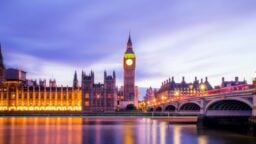Numerous groups representing artists and rights holders have backed new ‘landmark’ legislation designed to fight the proliferation of AI deepfakes – including musical deepfakes – in the US.
The Nurture Originals, Foster Art, and Keep Entertainment Safe (NO FAKES) Act would establish, for the first time, a federal property right in one’s own voice and likeness.
The bill was introduced in the US Senate on Wednesday (July 31) by two Democratic senators – Sen. Chris Coons of Delaware and Sen. Amy Klobuchar of Minnesota – and two Republicans, Sen. Marsha Blackburn of Tennessee and Sen. Thom Tillis of North Carolina.
The bill has received backing from many prominent members of the music industry, including Warner Music Group CEO Robert Kyncl, who appeared before the Senate Judiciary Committee in April in support of the legislation.
Speaking today, Kyncl said: “I am honored to have testified about the urgent need for deepfake legislation at the Senate Judiciary Committee’s April 30 hearing, and I’m grateful to Senators Coons, Blackburn, Klobuchar, and Tillis for their thoughtful crafting of the NO FAKES Act.
“Warner Music Group has always embraced new ways to bring technology and music together and recognizes the extraordinary promise of AI with commonsense guardrails to protect creators, innovators, and consumers. The NO FAKES Act strikes the right balance to propel the next wave of technology-powered creativity while safeguarding every American’s right to control the use of their own image and voice in the age of AI.”
“The NO FAKES Act strikes the right balance to propel the next wave of technology-powered creativity while safeguarding every American’s right to control the use of their own image and voice in the age of AI.”
Robert Kyncl, Warner Music Group
In a statement, Universal Music Group said: “The NO FAKES Act is landmark legislation to help foster ‘responsible AI,’ under which generative AI can fulfill its potential ethically, while cracking down on deepfakes and other misuses of individuals’ rights over their own voice and visual likeness.
“Success requires legislative guardrails like this to prevent AI companies from exploiting content without prior authorization. With this bill, Chairman Coons, Ranking Member Tillis, Senator Blackburn, and Senator Klobuchar recognize the importance of this issue to creators – and all Americans. We look forward to working together to achieving this mutually beneficial outcome.”
“With this bill, Chairman Coons, Ranking Member Tillis, Senator Blackburn, and Senator Klobuchar recognize the importance of this issue to creators – and all Americans.”
Universal Music Group statement
And in a separate statement, Sony Music said: “Sony Music applauds Senators Coons, Blackburn, Klobuchar and Tillis for this bipartisan effort to address the growing problem of AI deepfakes. The No FAKES Act recognizes that a human artist’s voice and image is the lifeblood of their career and worthy of the strongest protections.
“By creating a new federal right, this legislation will provide a meaningful new tool to put artists back in control of their identity and creative expression.
“Sony Music thanks the Senators for their leadership in promoting the ethical use of this technology, and looks forward to working with them toward passage of this critical legislation.”
Originally tabled for discussion last October, the bill is very similar in its content to the No AI FRAUD Act introduced in the House of Representatives in January.
Both bills seek to empower individuals to request that deepfake content featuring fake images of themselves be removed from platforms, and establishes the right of those individuals to sue when their right of voice or likeness has been violated.
The Senate version of the law also extends rights to the families of deceased persons, to protect their loved ones’ voice and likeness.
The bill’s bipartisan support, coupled with the existence of an accompanying bill in the House, gives it a high likelihood of becoming law.
“Sony Music thanks the Senators for their leadership in promoting the ethical use of this technology, and looks forward to working with them toward passage of this critical legislation.”
Sony Music statement
The bill’s supporters argue that it will go a long way to prevent the creation of deepfakes, including sexually explicit materials, that have violated the privacy of numerous individuals since AI-powered technology made it easy to create convincing fake imagery and vocals.
Recording Industry Association of America (RIAA) Chairman & CEO Mitch Glazier said: “As the music community embraces pro-artist, human-first uses of AI, the NO FAKES Act represents a huge step forward for smart, effective, guardrails against irresponsible and unethical uses of these technologies. By returning to first principles and creating an enforceable new intellectual property right, the legislation lays the foundation for free market negotiations that will propel both innovation and safety forward in AI, not just for artists but for everyone.
“By returning to first principles and creating an enforceable new intellectual property right, the legislation lays the foundation for free market negotiations that will propel both innovation and safety forward in AI, not just for artists but for everyone.”
Mitch Glazier, RIAA
“RIAA extends its deepest thanks to Senators Coons, Blackburn, Klobuchar, and Tillis and their teams for their persistent leadership in bringing stakeholders together to support this balanced, thoughtful, forward-looking legislation.” –
The bill has special meaning to the music and entertainment industries, which have been hit with a series of deepfakes that have violated artists’ and celebrities’ rights and infringed on copyright.
Among some of the most notorious examples are the “fake Drake” track, which went viral in the summer of 2023 before being pulled down by media platforms; a fake ad featuring actor Tom Hanks enforcing a product he never endorsed; and obscene images of Taylor Swift that went viral briefly on X before being pulled down earlier this year.
At the same time, the NO FAKES Act’s authors have sought to balance protecting voice and likeness rights with the principles of free expression, creating limited carve-outs to the law that would protect the use of AI-generated materials in news reports, documentaries, commentary, criticism and parody – though the law makes no exceptions for sexually explicit materials.
“The NO FAKES Act will help protect people, culture and art – with clear protections and exceptions for the public interest and free speech,” said Dr. Moiya McTier, Senior Advisor at the Human Artistry Campaign, a group devoted to preserving the role of human artistry and culture in the age of AI, whose founding members include the Recording Academy and the Recording Industry Association of America (RIAA).
“We urge the full Senate to prioritize and pass this vital, bipartisan legislation. The abusive deepfake ecosystem online destroys more lives and generates more victims every day – Americans need these protections now.”
“The NO FAKES Act will help protect people, culture and art – with clear protections and exceptions for the public interest and free speech.”
Dr. Moiya McTier, Human Artistry Campaign
Some US states, including California, Florida and New York, already enforce a “right of publicity” that gives individuals control over the use of their image and likeness, but so far, no such law has been passed at the federal level.
Most recently, the state of Tennessee – where the music industry forms a significant part of the economy – enshrined the Ensuring Likeness Voice and Image Security (ELVIS) Act into law. The new legislation updates the state’s “right of publicity” for the AI age, ensuring that materials created by generative AI are covered under the law.
The NO FAKES Act includes provisions to ensure that state-level laws like Tennessee’s won’t be overridden by federal legislation, so long as those state laws are in place as of the beginning of 2025.
“Protections are needed to ensure that creators’ intellectual property, voice, image, and likeness are not used without their permission.”
Mike O’Neill, BMI
“Music creators have always embraced new technologies to help make their art, and the use of generative AI tools will be no different,” BMI President and CEO Mike O’Neill said in a statement endorsing the bill.
“However, protections are needed to ensure that creators’ intellectual property, voice, image, and likeness are not used without their permission.”
Artist Rights Alliance Executive Director Jen Jacobsen said her group “applauds” the senators involved for introducing a bill “to help stop the insidious use of unauthorized AI deepfakes and voice clones. Musicians rely on their voice and image for their very livelihood and can ill afford to have their artistic and personal integrity violated by this abusive practice.”
She added: “No individual should have to live in fear of their likeness being exploited without consent, and the NO FAKES Act will help protect all of us from this predatory and unethical use of AI, of a technology that holds so much promise when used responsibly.”
“No individual should have to live in fear of their likeness being exploited without consent, and the NO FAKES Act will help protect all of us from this predatory and unethical use of AI, of a technology that holds so much promise when used responsibly.”
Jen Jacobsen, Artist Rights Alliance
“In the coming decade, legislation like the NO FAKES ACT is desperately needed to protect Americans from being victimized by technology that can replicate our image and voice,” said Fran Drescher, President of the SAG-AFTRA union that represents performers working in film, radio and TV.
“Thank you Sens. Blackburn, Coons, Klobuchar and Tillis for defending human rights by introducing the NO FAKES Act. People and communities must be protected in the face of innovation.”
The NO FAKES Act’s introduction comes amid a number of other legislative efforts in Washington to create a regulatory framework around artificial intelligence.
Earlier this month, a group of Democratic and Republican senators introduced the Content Origin Protection and Integrity from Edited and Deepfaked Media (COPIED) Act, which, among other things, creates a mechanism that effectively makes it unlawful for AI developers to use copyrighted material without permission to train AI models.
At present, a number of cases are working their way through US courts in which copyright holders have sued AI developers for using their content to train AI. AI companies have been arguing that their use of copyrighted materials should be given a “fair use” exemption to copyright laws. No courts have yet ruled on that argument.
Another bill addressing this issue has been introduced by California Democratic Rep. Adam Schiff in the House. The Generative AI Copyright Disclosure Act would require AI developers to notify the US’s Registrar of Copyrights about any copyrighted materials used to train AI algorithms.
Like the COPIED Act, this bill has gained the support of numerous artists’ and music industry groups, including as the RIAA, the American Society of Composers, Authors and Publishers (ASCAP), and the National Music Publishers Association (NMPA).Music Business Worldwide




